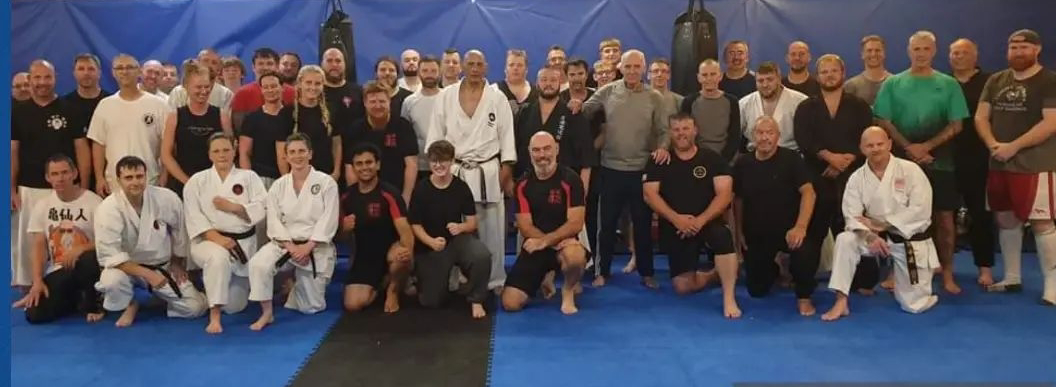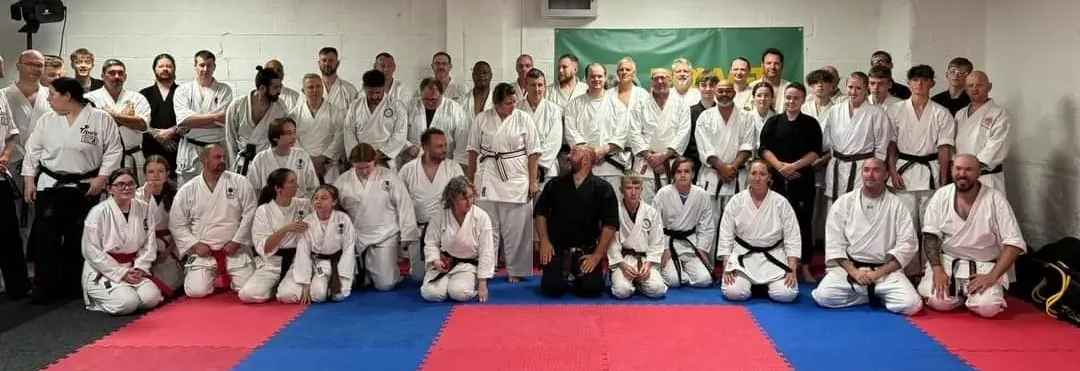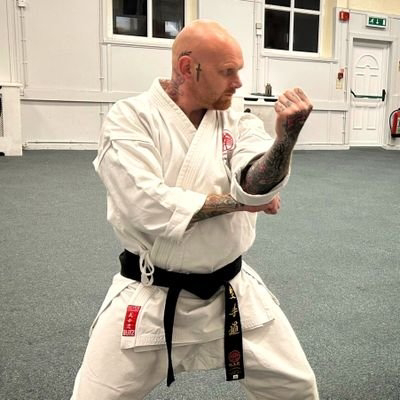The benefits of external training courses
I was going to call this entry "The importance of external training courses" but after some deliberation, I decided to replace the word 'importance' with the word 'benefits'. The reason being, if I emphasise that external training courses are important, this implies that if you are not taking part in external training courses/seminars, then you are missing an important part of your martial arts training. This is not necessarily the case. As I have said in previous blog posts, everyone has different reasons for training, everyone has different expectations and different desirable outcomes. If you are happy and content training in one style, at one club, and that satisfies your craving for knowledge, provides you with the training that suits your individual needs, and you have no desire to seek out any further learning, then external training courses/seminars are not important to you. If you have a wider interest in learning different skills, taught through different methods, travelling to new places and meeting new people, then external training will benefit you. This can be courses, seminars, camps, visiting different Dojos, cross training in different styles, or one-to-one sessions with different instructors.
I won't go into my full martial arts history here, it's all in my first blog post entitled 'Introduction' if you would like to read it, but I have been training at Shelf Karate Academy in Halifax for five years. I love it. It's home to me. The other members are like family to me. The syllabus is familiar to me. It's where I feel comfortable, safe and nurtured. For some members, they couldn't ask for more than that. For others, we seek more. We like to step out of our comfort zone, learn skills that are not in our syllabus and add new skills to our arsenal. Shelf Dojo will always be our base, our day to day source of training, but occasionally we like to enrich our training, and courses/seminars are the best source of external learning.
I'm a bit of a foodie, so I like to use the food analogy: Most households have a limited number of dishes that they serve, in rotation, for dinner each evening (Tea, if you live in the North!). Occasionally you might cook something you've not had in a while, but ultimately, we are creatures of habit. We know what we like, we have the ingredients in the kitchen, we know how to cook it, we know how much to serve, and it stops us being hungry. These meals represent our basic training at our own Dojo. Sometimes we might have dinner at a friend's house. They might serve one of their regular weekly dishes. Nothing out of the ordinary for them, but something a little different to us. This represents visiting another Dojo. On special occasions we might go to a restaurant, where the chefs have a number of speciality dishes on offer. If you have Lasagna or jacket potato at home every week, then when visiting a restaurant surely you're going to pick something new. Something different, something exotic, something exciting. Maybe even something you've never tried before. This represents training seminars. If you enjoy your restaurant meal, you might decide to cook that meal at home. Maybe in it's entirety, or maybe just bits of it. You might use those ingredients to compliment another dish, You might just decide to take ideas from it, add a starter, use more garlic, thicken a sauce, change which herbs you use or eat more seafood. Over time, the meals you serve at home evolve, become tastier, more variety, a sprig of sugared rosemary for a garnish? External training works in the same way. Skills and techniques learned on a seminar can be brought back to your regular dojo, and taught to your club. These skills can then be developed and woven into your existing skillset, broadening your arsenal and making you a more rounded martial artist.
So what makes a seminar different from regular Dojo training? Well, let's take an average Karate class. Let's say 20 students, an hour and a half class. Take off time for bowing in and warming up. That leaves just over an hour, twice weekly, to teach 20 people kata, basic technique, sparring, grading prep and educate them on the rich history of the martial arts (usually though a series of interesting, but questionable self-aggrandizing tall tales, haha). Sensei does not have the time to teach hours of pressure point work, for example, or the practical applications of a 200 year old Okinawan kata. He might teach some of this, occasionally, as part of the class, but he has to consider the learning needs of everyone, at every grade, within that class. Your Sensei/coach might not have an extensive knowledge of a particular area of expertise that you hunger for. If he doesn't, seek out a seminar that covers it in detail. 4 or 5 hours spent learning from an expert in that area is invaluable.
I believe that if you are open to new ideas, and attend external seminars, with different instructors, you gain a much richer understanding of the martial arts. The more varied the martial artists in your club, the more this influences the overall style of teaching in your club. If everyone in your club is open to it, it becomes one big melting pot of styles, that's ever changing, ever evolving. Many people who reach black belt or equivalent in a martial art then decide which branch to focus on. For some, it's competition, for other it's practical self protection, others may want to go on to teach, or open their own Dojo. Whichever path you decide to follow, additional external training will enrich your journey. I try to attend a few courses each year, in addition to cross training in Kickboxing to improve my Karate.
As well as finding what you like, sometimes a seminar/course/open day can show you what you don't like. Knowing what you don't like can be as important as what you do like, otherwise how do you know you're doing the right martial art for you? Some years ago I went on a Wing Chun seminar with Grandmaster Samuel Kwok. Whilst I appreciate the values of Wing Chun and have a great deal of respect for Grandmaster Kwok, I soon realised that Wing Chun wasn't for me. I had spent years in long, low stances, punching from the hip, and found standing in a more natural stance and chain punching from my centreline to be counter-intuative. Sometimes, you might learn something at a seminar that isn't relevant to you, or at least not relevant now, but it could be relevant later, or something you can teach to someone else. Two years ago I was at the UK Marital Arts Show in Doncaster, with some friends from our Dojo, and we did some taster sessions in different martial arts. One of the things we tried was Kickboxing. I'd done a bit of Kickboxing years before and had long since put it to bed. I enjoyed the session, we were taught some basics, light sparring and finished off with learning a Hurricane kick. Not something I thought I'd ever use, as I was a traditional Karate guy. Last year, I started doing some Kickboxing whilst training for a tournament and now the Hurricane kick is relevant to my Kickboxing training - not that I'm very good at them! I was recently listening to the 'Conversations on Karate' podcast with Ken Knight, and they touched on the subject of differences between self defence for men, and self defence for women; how each is likely to encounter different types of threat, in different environments, and require different approaches. It made me think that we need to start implementing different training for the girls who train at our Dojo. Earlier this month I was on a Close Quarter Combat seminar and one of the trainers, Louise Sweeting, of Extreme Impact, delivered a very insightful session on self defence for Women. It was a brilliant session, that the blokes could get involved in too. (I particularly liked the pre-emptive techniques from finger pointing, and the strangle escapes) Louise taught some really useful techniques that can be used by either men or women, but techniques she had developed with women's self defence in mind, and that Louise's female class had found a lot more practical than 'here's how to punch someone in the face'. I had a brief chat with Louise afterwards and she told me why she prefers these techniques for women. So, while the seminar wasn't targeted at me, it's with this knowledge and understanding that I can now start to build a set of skills for the girls at our club, using some of Louise's teachings as well as tailoring some of our own techniques to be more suited to female defence.
At this point, I feel that I need to point out that not everyone wants to change the way they train, and not all clubs welcome their members going elsewhere to have other instructors teaching their students new things, either because they wish to preserve the tradition and keep their style as original as possible, or because they are worried that what is being taught in the seminar contradicts their own teaching. I have trained at clubs like that myself. I remember training at one club who only ran one class a week. It was deemed unacceptable for members to train anywhere else, and to use a technique that wasn't learned under our syllabus was met with disdain. One of our members went to another club to get some extra training and when our Sensei found out, she was asked to leave the club.
I am very fortunate that Shelf Karate Academy are very open to members receiving as much external experience as possible, and excited about that knowledge being shared with everyone in the club. I recently went on a brilliant seminar with Iain Abernethy, where Iain taught the practical bunkai to Gankaku kata. Our Sensei, Syd Fletcher, changed our lesson plans so that we could all learn Gankaku before I attended the seminar, then upon my return, had me take the class so that I could share the wisdom. Iain has an extraordinary ability to see techniques buried deep in kata, and teaches it in a fun and interesting format. Even though the bunkai Iain taught was different from the bunkai my Sensei took from the kata, my Sensei was open to hearing, and learning another Sensei's take on it.
Another benefit to attending seminars is the opportunity to network and make new friends. I will admit that it can be a little bit daunting attending a seminar, in an unfamiliar place, with people you don't know, particularly if you're going alone. If you feel apprehensive about going alone, then try to persuade someone from your club to go with you. If you can't get someone to go with you, then brave the apprehension. I have always found the martial arts community to be very friendly, accepting, welcoming and helpful. You will soon make new friends. Friends who you may see again at other seminars, over and over again. A couple of years ago, I was at a seminar with Katsu Sensei, and I was partnered up with a guy called Craige. I saw Craige again a year later at a Close Quarters seminar. On the Close Quarters seminar I met a guy called Phil, who I met again some months later at an interclub tournament. I have had interactions on social media Kieran Makenji from the 'Karate Ramblings' podcast. I met with him recently, doing Kudo with Mal Sanchez Jones of Goshin and Kudo Academy, Wales. Mal is up North in November teaching a Kudo seminar, and I'm sure I'll see him again there. Incidentally, I first met my Kickboxing coach, Mark Spencer, when he was teaching a Kudo taster day. It turns out he also knows Mal and Kieran, the four of us had a photo taken together recently. Seminars are not just an opportunity to train with friends, but for many, a great opportunity to meet your idols; to train with your idols, to become friends with your idols. For many years I've looked up to Sensei Peter Consterdine. I've watched his videos and interviews and read his books. I've had the privilege of training with Peter a few times now, and regard him as a friend. The more seminars and courses you go on, the more you realise that the martial arts community is one big network of friends. If we were to turn our attention to organized crime, we would be the equivalent of the mafia, with awesome fighting skills!










Comments
Post a Comment